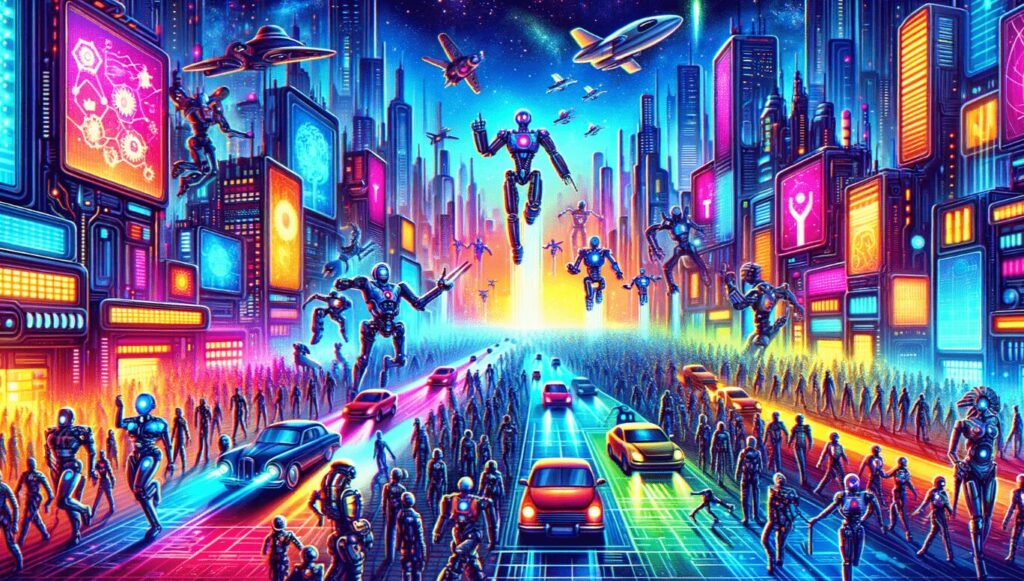On November 30th, 2022, ChatGPT was publicly made available. This marked a significant milestone in the field of artificial intelligence, symbolising a leap forward in AI technology and its widespread availability. This momentous occasion has had wide-ranging and varied implications, including levelling the playing field across different professions, reducing the costs linked with generating content and initiating debates on ethical considerations surrounding AI usage.
ChatGPT and Language Learning Models in general, with their capability to comprehend and produce text that resembles human conversation, have made tasks that once required specific expertise, from programming to writing, accessible to a wider audience. This broader access to technology has spurred innovation while also prompting discussions about the future of employment, privacy, AI SEO Agencies, and AI’s influence on human interaction.
The Role of Human Expertise in SEO
The emergence of artificial intelligence is transforming many industries, including SEO. New AI tools can now automate repetitive SEO tasks like keyword research, content optimisation, and link building. Some predict that AI may one day surpass human capabilities in conducting technically driven SEO activities.
However, most experts agree [Note] that AI is unlikely to fully replace the need for human expertise and strategic thinking in SEO. While AI excels at processing large datasets quickly and at scale, human professionals provide essential context, creativity, and judgement that AI currently lacks.
Psychology and Critical Thinking
Understanding user intent and appeal requires a nuanced understanding of human psychology and emotions. Even the most advanced NLP models cannot yet fully grasp the subtle intricacies of what motivates and resonates with people. Human SEO experts draw upon years of experience working with real users to optimise content in an authentic way.
Humans also excel at big-picture strategic thinking. Setting objectives, prioritising focus areas, and devising an effective SEO roadmap requires a human overview of the landscape. Machines can optimise individual pages, but only humans can determine the optimal site architecture and user journey.
And when the inevitable algorithm updates occur, human experts are needed to discern meaningful implications. AI cannot yet match the intuitive judgements of seasoned SEO veterans familiar with historical trends.
So while AI will become integral to SEO tools and workflows, human creativity, critical thinking, and strategic oversight will remain essential. The most effective future SEO approach will likely involve collaboration between human expertise and AI capabilities. The two complement each other, with AI handling data-heavy technical optimisations and humans providing strategic guidance, creativity, and discretionary judgment.
The Evolution of SEO Practices
While SEO remains fairly similar at its core; content, technical and links, tools powered by AI have the capability to automate time-consuming and monotonous tasks, furnish valuable insights, and assist in the optimisation of content. Nonetheless, the essence of SEO strategy, encapsulated in comprehending search intent, devising content centred around the user, and forging connections on the internet, cannot be substituted by AI on its own.
We’re also witnessing a significant evolution in how search engines operate and the kinds of content they prioritize. For instance, video content is becoming increasingly important, with the popularity of TikTok, Reels, and Instagram shorts on the rise. This marks a shift in the user journey, indicating that SEO isn’t just about articles and blog posts anymore. Instead, it’s about enhancing the entire search experience, moving away from focusing solely on large blocks of text to a more comprehensive approach that includes diverse types of content.
AI-Driven Content Creation and Optimisation
While AI and language learning models can quickly generate a large volume of content, they are limited to what they’ve been trained on from existing data. Relying solely on tools like ChatGPT for new content creation risks ending up in a place where content is merely copied from one source to another, lacking originality. Thus, while ChatGPT and similar tools can lay the groundwork for content structures or provide outlines and partial sections, the inclusion of expert knowledge or insights derived from unique human experiences—unavailable to AI—is crucial.
For instance, writing a review will transcend mere product description; it could evolve into a personal narrative, with the reviewer physically interacting with the product, sharing personal opinions, branding, and expertise. This human touch is what will likely earn greater trust and value from audiences in the future.
Although AI can greatly assist in content creation and optimisation through data analysis, identifying pertinent keywords, and generating content concepts, the depth, creativity, and emotional resonance of content produced by humans retain considerable importance. Content generated by still AI needs human supervision to ensure its quality, relevance, and the addition of a personal touch.

The Impact of AI on Link Building and Keyword Research
When it comes to AI-driven link-building and keyword research, several important considerations come into play. Firstly, AI significantly enhances the capacity for large-scale outreach, making it easier and more cost-effective to build links. This improvement offers agencies, as well as in-house teams, a simpler way to reach out for link opportunities.
Regarding keyword research, it’s crucial to understand that language learning models (LLMs) are not SEO tools in the traditional sense. They do not provide actual data but rather respond with answers based on statistical likelihood. Therefore, while it might seem like they are conducting keyword research, they are simply suggesting the most statistically logical words.
To effectively leverage AI for keyword research, it’s advisable to supply the AI tool with real data. This could include information from “People Also Ask” on Google, Google autocomplete suggestions, or exports from your preferred SEO tool, such as SEMrush or Ahrefs. This data can then be utilised by an AI tool, through a plugin or code interpreter, to offer valuable insights. The AI can then help identify content clusters, suggest additional content ideas, or propose unique perspectives you might not have previously considered.
Adapting SEO Strategies in the Age of AI
When AI became widely accessible, the SEO community was divided into two main groups. On one hand, there were those who criticised AI content and processes as inferior, viewing AI as a threat to their jobs and the skills required for their tasks. On the other hand, a different group embraced the enhancements AI brought, excited about the significant power and leverage it offered. This division sparked considerable debate towards the end of 2022 and into early 2023 about AI’s impact on SEO.
As time has progressed, it’s become clear that businesses adapting to include AI in their strategies are thriving and growing. In contrast, those sticking to traditional methods and relying solely on human writers and processes are finding their costs increasing and their competitiveness declining. Therefore, the issue isn’t whether AI content is inherently good or bad; AI itself is neutral. It’s how AI is utilized that determines its value to a business or organization.
Future Prospects & Coexistence of AI and SEO
As we look ahead, AI and SEO are anticipated to coexist, each fulfilling complementary roles within the digital marketing ecosystem. AI is set to manage the analytical and routine tasks, leaving human SEO professionals to concentrate on strategic planning, crafting creative content, and making nuanced decisions.
So, Will SEO be Replaced by AI?
Only time will tell, but through this article, we came to a series of conclusions and corollaries:
- The emergence of AI and language models like ChatGPT has sparked spirited discussions within the SEO community about the future role of human expertise.
- While AI excels at automating routine technical tasks at scale, seasoned SEO professionals provide indispensable strategic oversight, creativity, and judgment.
- Moving forward, AI and human skills will likely complement each other – with AI handling data-driven optimizations and content generation, while humans focus on high-level strategy, nuanced decision-making, and imbuing content with creativity. The most effective future approach will involve collaboration between human expertise and AI capabilities.
- While AI will transform aspects of SEO workflows, human ingenuity, critical thinking and emotional intelligence will remain integral to devising insightful strategies that truly resonate with target audiences. The two skill sets are not mutually exclusive, but rather interdependent in optimising the user experience.
Note: AI Replacing Job Statistics – https://gitnux.org/ai-replacing-jobs-statistics/

Hi, I’m Nicholas Bortoluzzi (but people often call me Nico).
I am the Founder and Director at SEO Lynx, an internet marketing agency operating in the UK and servicing clients worldwide.
The article on this page was written and curated by myself.
